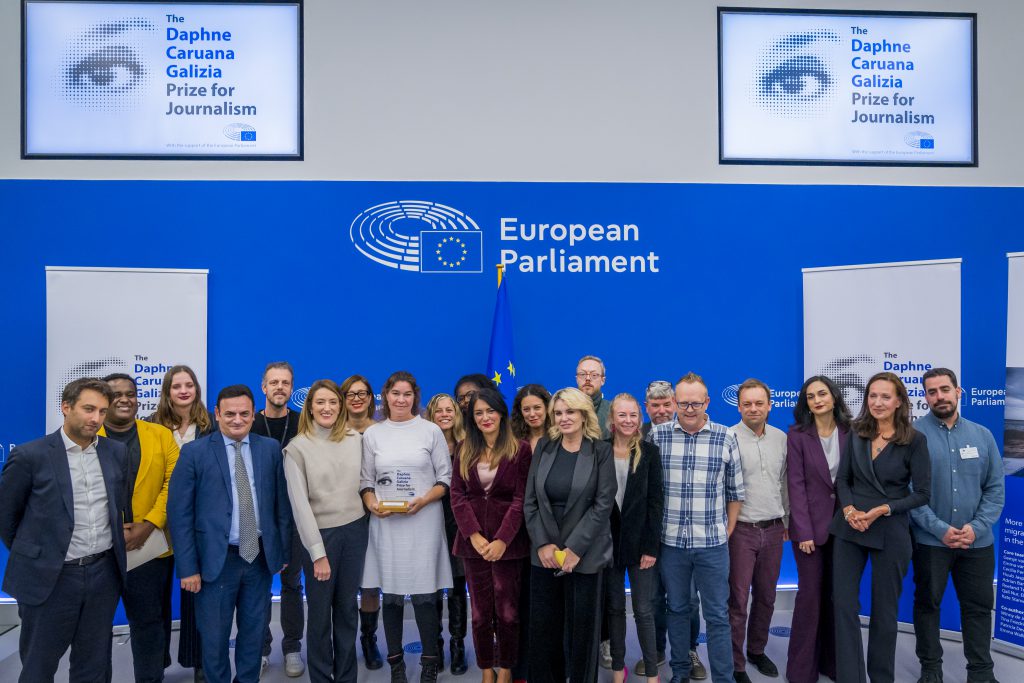Investigation into missing unaccompanied child migrants wins the 2024 Daphne Caruana Galizia Prize for Journalism

Lost in Europe won the 2024 Daphne Caruana Galizia Prize for Journalism for its investigation into the disappearance of over 50 000 unaccompanied child migrants.
The fourth edition of the Daphne Caruana Galizia prize for journalism was won by the investigation Lost in Europe
The investigation, run by media from Germany, Italy, Greece, the Netherlands, Belgium, Ireland and the UK revealed that at least 51 433 unaccompanied child migrants disappeared after arriving in European countries between 2021 and 2023.
Roberta Metsola, President of the European Parliament, Pina Picierno, Vice-President responsible for the Prize, and representatives of the independent European-wide Jury of the Prize participated in the award ceremony held in the European Parliament’s Daphne Caruana Galizia Press Room in Strasbourg.
President Metsola said: “Daphne Caruana Galizia’s legacy continues through the work of journalists who live to tell the truth and refuse to be silenced. Their fight for justice prevails over the threats that try to undermine their important work. Press freedom is non-negotiable. Seven years after Daphne’s assassination, we continue to honour her memory with a prize that reminds us of this Parliament’s long-standing commitment to these fundamental values”.
Between 3 May and 31 July 2024, hundreds of journalists from the 27 EU countries submitted their stories for consideration. Thirteen of the 318 submissions were shortlisted by the jury before the winner was chosen.
About the Winning Story
Lost in Europe uncovered the staggering reality that, since 2021, on average nearly 47 children have vanished each day after arriving in Europe.
Data collected by Lost in Europe from 31 European countries, including Austria, Germany, and Italy, reveal that tens of thousands of migrant children are missing.
The months-long investigation shows that the number of missing migrant children could be even higher, as inconsistent documentation and the lack of data collection by some countries contribute to significant gaps in reporting.
This latest investigation builds on Lost in Europe’s 2021 research, which revealed that over 18 000 migrant children went missing in Europe between 2018 and 2020.
As Aagje Ieven, Secretary General of Missing Children Europe, noted, the findings are likely just the “tip of the iceberg,” as more child migrants continue to disappear at alarming rates in Europe, with many feared to be victims of human trafficking and modern slavery.
The publishing partners for this investigation were De Standaard, (Belgium), Small Stream Media (the Netherlands), RBB (Germany), Knack (Belgium), ANSA (Italy), Domani (Italy), CNN (UK/US), VRT (Belgium), Εfimerida ton Syntakton (Greece), , The Journal (Ireland), Tagesschau (Germany), and NRC (the Netherlands).
About the Prize
The Daphne Caruana Prize was initiated by a decision of the European Parliament’s Bureau in December 2019 as a tribute to Daphne Caruana Galizia, a Maltese anti-corruption investigative journalist and blogger who was killed in a car bomb attack in 2017.
Every year, the Prize rewards (on the anniversary of the assassination of Daphne Caruana Galizia) outstanding journalism that promotes or defends the core principles and values of the European Union such as human dignity, freedom, democracy, equality, rule of law, and human rights.
Professional journalists and teams of professional journalists of any nationality can submit in-depth pieces that have been published or broadcast by media based in one of the European Union’s 27 member states. The aim is to support and highlight the importance of professional journalism in safeguarding freedom, equality and opportunity.
The independent jury is composed of representatives of the press and civil society from the 27 EU member states and a representative of the International Federation of Journalists.
The Prize and the €20,000 in prize money demonstrate the European Parliament’s strong support for investigative journalism and a free press.
